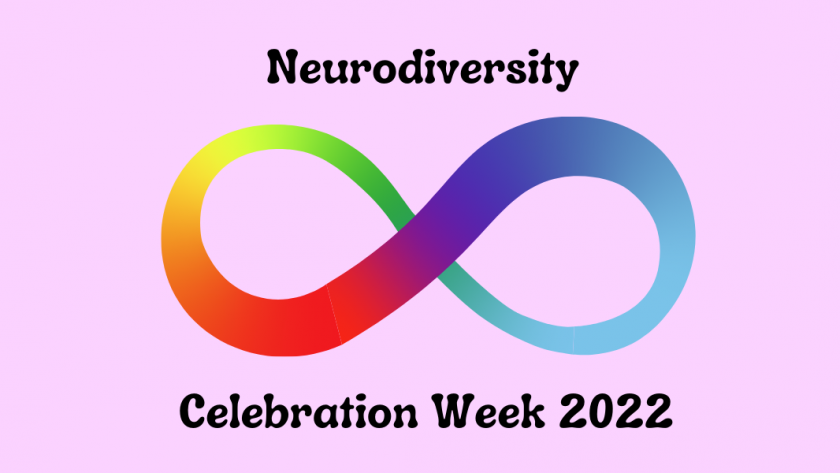[Content Notice: Today’s post contains mention of Aut1$m $peak$, an organization with a very troubling history on so many levels, and also views neurodiversity as something to be cured. I need to make it clear that I do not support this agency, and I encourage you to do likewise. There’s also mention of workplace abuse, so if that’s something you need to take into consideration in order to safeguard your own emotional well-being, I encourage you to give today’s post a miss, and go check out some of my other stuff. No hard feelings at all, you need to do what’s best for you. If you decide to move forward with today’s post, and it brings up some difficult feelings for you, I encourage you to reach out to the people at the Crisis Text Line. If you’re outside the U.S., this site has resources specific to your local area.]
Here at The Mission Within, we’re all about celebrations and observances, and this week is Neurodiversity Celebration Week 2022. For those of you who may not be in the loop, neurodiversity is acknowledging that not everyone is wired the same way, meaning both neurotypical and neurodivergent. On that note, neurodivergent includes a range of diagnoses including ADHD, autism, dyscalculia, dyslexia, etc.
For the purpose of this post, unless otherwise specified, I will be using the term “neurodivergent” as a descriptive term if the specific diagnosis isn’t mentioned, or if it’s the term they use.
Today, we’ll focus on neurodiversity in the workplace. I could go on about how difficult school can be for someone who’s neurodivergent in any way, and how too many school systems set them up to fail from the get-go.
The workplace can be a difficult nut to crack for neurodivergent employees for a whole slew of reasons, from the way the site is set up, toxic or cliquey work environments, to leadership team members who either know and don’t care, or worse: actively engage in abusive behavior themselves.
This piece by Ludmila N. Praslova, PhD, SHRM-SCP, talks about just how abusive things can get for someone who’s neurodivergent. She talks about a story involving a neurodivergent team member, and the stereotypes the other team members bought into. Someone at the company tried to dump more work on this team member, and threatened to harm them into doing so by utilizing known triggers that caused pain and suffering.
The worst part of all about this? These abusive threats were coming from someone in the senior leadership team, and it was a so-called “Chief Diversity Officer.”
I’m dead serious. The piece goes on to state that this Chief Diversity Abuser apparently had a huge passion for diversity, and honestly believed they did (so scary!), but it didn’t include neurodiversity in their definition of the word.
Then who tf is their idea of diversity for, anyway?
The piece goes on to talk about how this isn’t an isolated incident, and when it comes to neurodivergency in the form of autism in the workplace, many people cited that they either don’t have that problem, they don’t have the time, or they’d love to have someone with autism on their team. The range of responses according to Praslova stems from the stereotypes and people’s preconceived ideas of what autism looks like based off of this kid in their neighborhood or something they saw on TV forever ago.
Maybe these ideas could’ve come from what they saw in TV ads for a certain well-known agency with a troubling track record like Aut1$m $peak$, or maybe in movies. As an aside, Rain Man is all about one of the stereotypes, from what I’ve read. I’ve never seen the movie, and have no plans to do so.
I really hope this person has moved on from this rathole of an agency to greener pastures, and has since left these flaming turds in their rearview mirror. Shyt like this has a funny way of catching up to the doers, and we all know what they say about karma.
Anyways, these stereotypes about neurodivergency in the form of autism tie in with othering, because when an autistic employee doesn’t look or act in the way that matches the preconceived ideas among the Powers that Be, there’s a huge likelihood the Powers that Be will write them off or say that Employee ABC isn’t “really” autistic.
Who tf are these company leadership members to dictate who counts as neurodivergent or not? Who tf died and made them the boss of the world? Are they doctors? I’m guessing probably not. Even if they somehow were doctors, were they Employee ABC’s doctor? Also probably not. What gives them the right to decide who counts as “really” autistic, and whose standards are they using to gatekeep someone’s neurodivergency?
Later on in the post, there’s mention of a horrifying statistic involving the unemployment rates among autistic members of the workforce. It mentions an 85% unemployment rate among autistic college graduates, and that’s beyond despicable.
Based on my own experience in this wretched job search, I can almost guarantee you this has ruined people’s lives.
Hey, employers: instead of treating neurodivergent applicants and employees like shyt, how ’bout you start doing better by hiring them if they’re qualified to do the job, and pay them what they’re worth? Just something I thought I’d throw out there as a little life pro-tip. Yer welcome.
This piece from Harvard Business Review talks about how the real reason so many autistic members of the workforce end up getting held back is discrimination. I’d even go out on a limb and guess that discrimination is the reason why the grim statistic of the 85% unemployment rate among autistic college graduates is even a thing. If it’s not the sole cause, then it’s a major contributor.
The Harvard Business Review piece goes on to talk about the choice to disclose a neurodivergent diagnosis, since neurodivergency isn’t a monolith, and it can look different for everyone. The choice is always ours, not anyone else’s. Sometimes it isn’t safe for any number of reasons, like this.
Fair warning, this piece isn’t for the faint of heart. If it brings up some upsetting feelings for you, definitely take a step back and talk with someone. In that newsletter, the author, Elizah, talks about how her (now thankfully) former employer was an attorney, and that they were abusive toward her because she’s autistic.
I was at a loss for words the first time I read it. I believed every single word of it. I do now, and I always will. Like I mentioned before, this hits close to home for me. Even if it didn’t, I’m not in the business of doubting someone else’s lived experience, and it ain’t my place to do so.
Shyt like what Elizah described her former employer doing to her has a funny way of coming back to haunt the doers, btw.
Back to disclosing a neurodivergent diagnosis in the workplace. The HBR article talks about how not doing so is a form of assimilation and plays into discrimination. However, if you’re neurodivergent, you get to be the one to decide whether to disclose or not, how you’d like to do it, and who to disclose to. Some employers will be cool about it, and sadly some may not be. It’s a huge gamble, and you know your circumstances best.
It’s a shameful statement about our society that so many treat neurodiversity like this. We’re not radioactive, ffs. It’s also shameful how agencies set up by neurotypical people for neurotypical people like The One That Must Never Be Named don’t help anyone in any measurable sense, and well-meaning people show their support to them.
Over to you, readers. How are you gonna spend Neurodiversity Celebration Week 2021? Me, I’m gonna spend it by job hunting, focusing on companies that value diversity, equity, and inclusion. I’m also gonna take some LinkedIn courses on this, too. It’s way too cold outside to do much of anything, and will be for the rest of this week. ‘Nuff about me. I’d love to hear your thoughts and takeaways, so drop it all like it’s hot below, and let’s talk.



